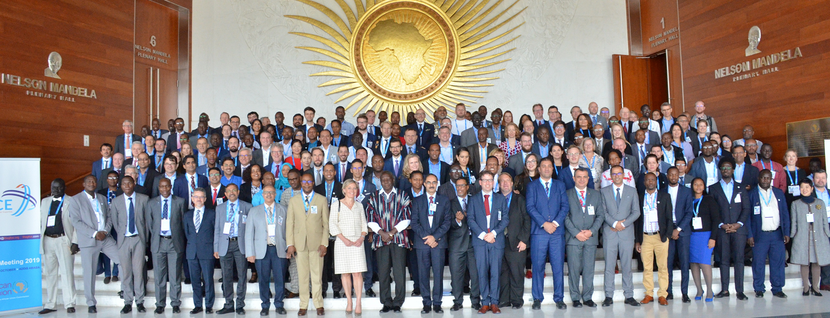About GFCE
Mission Statement
Every citizen of the world should be able to fully reap the benefits of ICT through a free, open, peaceful and secure digital world. Building cyber capacity provides the necessary foundation for countries to strengthen their cyber resilience through developing skills and capacity that address threats and vulnerabilities arising from cyberspace. It is therefore our mission to strengthen cyber capacity and expertise globally through international collaboration and cooperation.

How does the GFCE support cyber capacity building?
The GFCE strengthens international cooperation on cyber capacity building by connecting needs, resources and expertise and by making practical knowledge available to the global community. The current focus of the GFCE is three-fold: coordinating regional and global cyber capacity projects and initiatives; sharing knowledge and expertise by recommending tools and publications; and matching individual needs for cyber capacities to offers of support from the community as a clearing house function. With an effective global clearing house mechanism, the GFCE improves efficiency on a global level in the delivery of capacity building programs by avoiding duplication and blind spots. An additional focus introduced in the second half of 2020 is the collecting and prioritizing of research gaps (as identified by the GFCE Working Groups) into a global cyber capacity building Research Agenda.
The GFCE is also a platform for high-level discussion, organizing biannual meetings to assess progress and hold policy discussions on ways and means of responding to emerging challenges in the cyber capacity building domain. Multi-stakeholder GFCE events contribute to the development of best practices and therefore has added value for the wider cyber capacity building community globally. In 2023, the GFCE intends to hold inaugural regional meetings across five continents, improving the platform’s regional coordination and presence.
History of the GFCE
The GFCE was established during the 2015 Global Conference on Cyber Space in the Hague to strengthen cyber capacity building and coordinate existing international efforts more effectively. The GFCE was launched by the Dutch Government along with 41 ministers and other high-level representatives from business and international organizations.
In its formative years, the GFCE was focused on building a strong network and raising awareness to existing global capacity building projects and programs. During this time, the GFCE structured its work around practical initiatives that were developed under the GFCE umbrella.
In 2017, at the Global Conference on Cyber Space in New Delhi, the GFCE positioned itself as the coordinating platform for cyber capacity building by developing the Global Agenda for Cyber Capacity Building. After a year of conducting extensive consultations and research, the entire GFCE unanimously endorsed the Delhi Communique, which prioritizes 11 topics under 5 broad themes on cyber capacity building.
An important step towards concrete action for Cyber Capacity Building worldwide was the establishment of GFCE Working Groups that focused on one of these five identified themes. In 2018, the five Working Groups developed at a rapid pace with approximately 80% of the Community contributing to the Working Groups. As a strong foundation to efficiently facilitate exchange, collaboration and knowledge-sharing was established, the priority of the GFCE shifted to strengthening the GFCE ecosystem in 2019.
During the year, the GFCE further developed its clearing house function, launched the Cybil Knowledge Portal, and embarked on its transition into an independent, not-for-profit GFCE Foundation.
Under a new governance structure that includes the Foundation Board, the Foundation is a vehicle that enables the GFCE to grow sustainably, become even more internationalized and accept funding from multiple donors. This allows the GFCE to fortify its position as the global coordinating platform on cyber capacity building; become more effective and efficient, work towards an effective clearing house mechanism and implement a Global Cyber Capacity Building Research Agenda to fill knowledge gaps and needs.
GFCE Founding Documents
DELHI COMMUNIQUÉ
The Delhi Communiqué is the GFCE Global Agenda for Cyber Capacity Building, endorsed by all GFCE members and reaffirms their shared commitment to strengthen cyber capacity and expertise globally.
Publication Date: September 16 2015The Hague Declaration on the GFCE
Political statement of the 42 founding members during the launch of the GFCE on 16 April 2015 at the Global Conference on CyberSpace 2015 in The Hague.
Publication Date: April 16 2015Framework Document GFCE
This Framework Document outlines the structure and operation of the GFCE in a way that is voluntary. complementary, inclusive and resource driven.
Publication Date: March 18 2016Terms of Reference GFCE
This document provides further details on the operational aspects of the GFCE and should be read in junction with the GFCE Framework Document and The Hague Declaration on the GFCE.